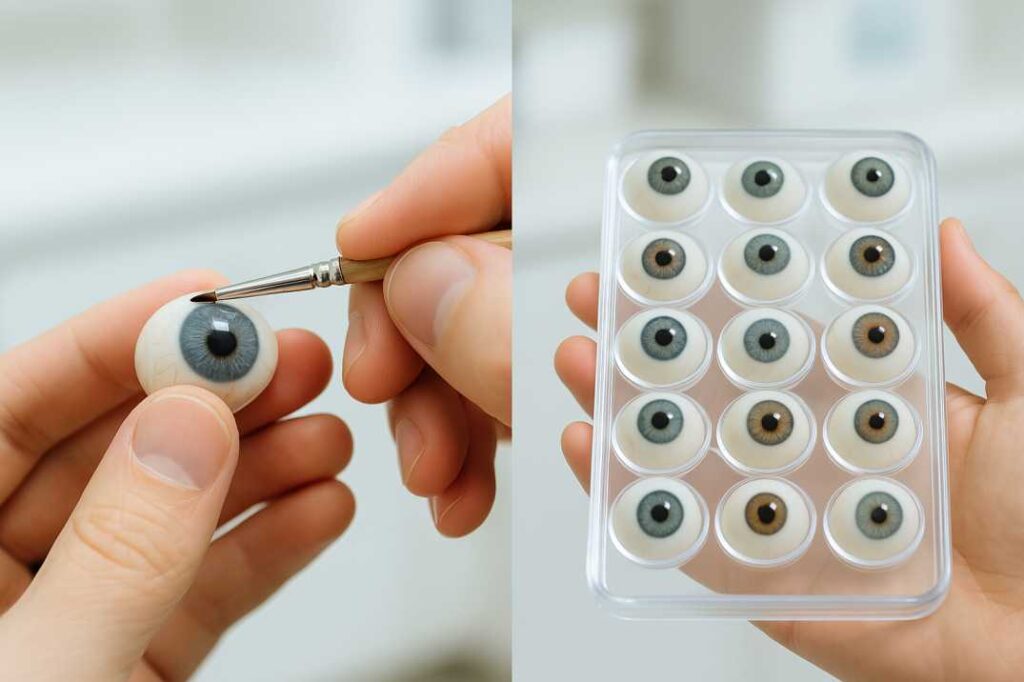Everything You Need to Know About Prosthetic Eyes
Seeking the top prosthetic eye options in Seattle? Discover how custom and stock designs restore a natural look, boost your confidence, and perfectly match your lifestyle.
Key Takeaways
-
Custom vs. Stock Options: Custom prosthetic eyes deliver unmatched comfort, fit, and realism, while stock versions serve as a temporary, lower-cost solution during healing.
-
Realistic Movement: Proper surgical preservation of eye muscles allows prosthetic eyes to move naturally—up to 80% of a healthy eye’s range.
-
Seattle Costs & Coverage: Expect $3,500–$8,000 for custom prosthetics; most major Washington insurance plans and Medicare Part B cover 80–90% of costs, including periodic replacements.
-
Care is Crucial: Daily cleaning and annual professional maintenance extend lifespan and preserve comfort; urgent replacement is needed for cracks, discoloration, or poor fit.
-
Pediatric Needs Differ: Children require more frequent replacements, growth monitoring, and coordinated school support for safe daily use.
-
Technology is Evolving: 3D-printed prosthetics offer faster, more affordable production; “smart” prosthetic eyes with movement sensors and health monitoring are on the horizon.
-
Choose Specialists Wisely: Partner with experienced ocularists who have strong patient satisfaction records, offer same-day emergency care, and meet strict training standards.
What Are Prosthetic Eyes & How Do They Work?
Prosthetic eyes (ocular prosthetics) are custom-crafted artificial devices that replace the appearance of a missing natural eye. While they don’t restore vision, these cosmetic prostheses are meticulously designed to:
-
Match your remaining eye’s unique color, size, and patterns
-
Provide natural-looking movement
-
Restore facial symmetry and confidence
Types of Prosthetic Eyes Available in Seattle, WA
1. Custom-Made Prosthetic Eyes (Cannon EyeCare Specialty)
-
Hand-painted by our Seattle ocularists to mirror your natural eye
-
Perfectly fitted to your eye socket anatomy
-
Completed in 3–4 weeks at our Seattle clinic
-
Higher investment for superior comfort, appearance, and long-term wear
2. Stock Prosthetic Eyes
-
Pre-manufactured in standard sizes/colors
-
Immediate availability for temporary use
-
Lower-cost option with limited customization
-
Ideal for post-surgery healing at our Seattle practice
How Prosthetic Eyes Achieve Natural Movement
At Cannon EyeCare in Seattle, modern prosthetic eyes move realistically by:
-
Fitting precisely over preserved eye muscles post-surgery
-
Resting on a conformer or tissue bed
-
Synchronizing movement with your natural eye (60–80% normal range)
Your Prosthetic Eye Journey: Surgery to Final Fitting in Seattle
1. Initial Consultation at Cannon EyeCare
Begin your journey with a comprehensive evaluation at our Seattle clinic. Well:
-
Assess your eye socket anatomy
-
Discuss lifestyle needs and aesthetic goals
-
Outline personalized timelines and costs
-
Connect you with our trusted Seattle ocularist partners
2. Enucleation or Evisceration Surgery Explained
-
Enucleation: Removes the entire eyeball while preserving muscles/orbital tissues
-
Evisceration: Removes eye contents only, leaving the outer shell
-
Recovery: 6–8 weeks with a temporary conformer to maintain socket shape
3. Custom Prosthetic Creation Timeline (Seattle Clinic)
-
Weeks 1–2: Socket impressions + measurements
-
Weeks 3–4: Hand-painting + structural adjustments
-
Weeks 5–6: Final fitting + movement testing
-
Week 7+: Follow-ups for comfort optimization
4. Prosthetic Eye Costs & Insurance for Seattle Residents
Pricing in Seattle, WA:
-
Custom prosthetic eye: $3,500 – $8,000
-
Stock prosthetic: $500 – $1,500 (temporary solution)
-
Replacements: $2,000 – $5,000
-
Annual maintenance: $200 – $500
Washington State Insurance Coverage:
-
Accepted providers: Premera Blue Cross, Kaiser Permanente, Regence BlueCross BlueShield
-
Typical coverage includes:
-
80–90% of fitting/device costs
-
Replacements every 5–7 years (adults)
-
More frequent replacements for patients <18
-
Annual cleaning/adjustments
-
-
Medicare Part B: Covers 80% for Seattle seniors post-deductible
Daily Care & Maintenance: Expert Tips from Our Seattle Team
Daily Cleaning Routine (2–3 Minutes)
-
Morning Care Protocol:
-
Wash your hands with antibacterial soap
-
Remove prosthetic using proper technique
-
Rinse the device with sterile saline solution
-
Gently clean the socket with the prescribed solution
-
Reinsert with clean hands
-
Weekly Deep Cleaning
-
Seattle Clinic Recommendations:
-
Soak in enzyme cleaner for 10 minutes
-
Clean gently with a soft-bristle brush
-
Polish using medical-grade cloth
-
Inspect for scratches/damage → Schedule a professional check if needed
-
When to Replace Your Prosthetic Eye
-
Adults: Every 5–7 years (or significant wear)
-
Children: Every 1–2 years (due to facial growth changes)
-
Urgent Replacement Needed If:
-
Cracks/chips in the prosthesis
-
Discoloration that won’t clean
-
Poor fit causing discomfort
-
Persistent irritation or discharge
-
Children & Prosthetic Eyes: Special Care for Seattle Families
Pediatric Prosthetic Eye Care
Children require specialized approaches due to growth and development. Our Seattle clinic provides:
-
Growth Adaptations:
-
Replacements every 12–18 months
-
Regular socket expansion procedures
-
Facial development monitoring
-
-
School Integration Support:
-
Teacher training on prosthetic care
-
Peer education resources
-
Emergency protocols for Seattle-area schools
-
Psychological Support Resources in Seattle
We partner with Seattle Children’s Hospital to offer:
-
Child psychologists for emotional support
-
Family peer groups
-
Sibling/friend education materials
Latest Prosthetic Eye Technology Advances
1. 3D-Printed Prosthetic Eyes (Available in Seattle)
-
Faster production: 2–3 weeks vs. traditional 6–8 weeks
-
Perfect fit: Digital scanning accuracy
-
Cost savings: Reduced manufacturing fees
-
Easy replacements: Digital file archives
2. Smart Prosthetic Eyes (Emerging Tech)
Currently in clinical trials:
-
Movement sensors for enhanced tracking
-
Experimental vision-restoration cameras
-
Wireless health monitors
-
Self-adjusting socket materials
Choosing the Right Prosthetic Eye Specialist in Seattle
Key Questions for Seattle Ocularists
Ask these critical questions during consultations:
-
“How many prosthetics do you fit annually?”
-
“What’s your experience with my specific condition?”
-
“Can you share Seattle-area patient references?”
-
“What’s your adjustment policy and warranty?”
-
“How do you handle Seattle emergency repairs?”
Cannon EyeCare’s Seattle Prosthetic Network
We partner exclusively with board-certified ocularists meeting our strict criteria:
-
10+ years of prosthetic fitting experience
-
Annual training in advanced techniques/materials
-
95%+ patient satisfaction scores
-
Same-day emergency care for established patients
Red Flags & Emergency Care
Contact our Seattle emergency line immediately for:
-
Severe socket pain/throbbing
-
Foul-smelling yellow/green discharge
-
Swelling preventing insertion
-
Sudden fit changes
-
Fever or facial redness spreading
Prosthetic Maintenance Schedule
-
Monthly: Self-check fit/appearance
-
Quarterly: Professional cleaning + adjustments
-
Annually: Comprehensive evaluation
-
As needed: Emergency repairs
A prosthetic eye is more than just a cosmetic device—it’s a life-changing solution that restores confidence, balance, and natural appearance. Whether you choose a fully custom-made prosthesis or a temporary stock option, the right fit, care routine, and specialist can make all the difference. With advanced technology like 3D printing and emerging smart prosthetics, your options in Seattle have never been more promising.
Ready to take the next step? Schedule your consultation with Cannon EyeCare’s Seattle prosthetic eye team today and discover the perfect fit for your needs, lifestyle, and budget. Call us now or book online to start your journey toward a natural, confident look.
FAQs
-
Prosthetic eye costs range from $2,500 to $8,000. Custom prosthetics cost more than stock options, with insurance covering 80-90% of costs for most patients.




